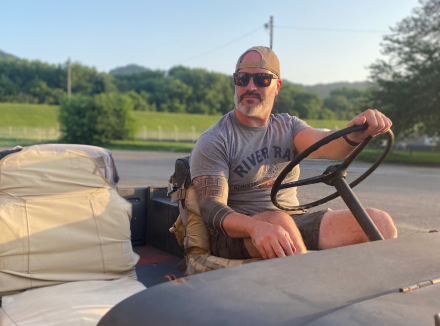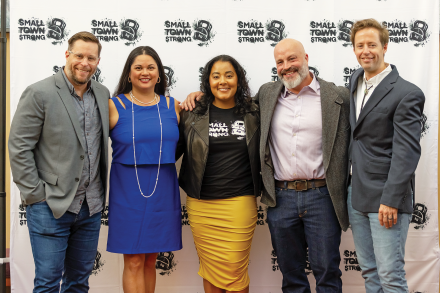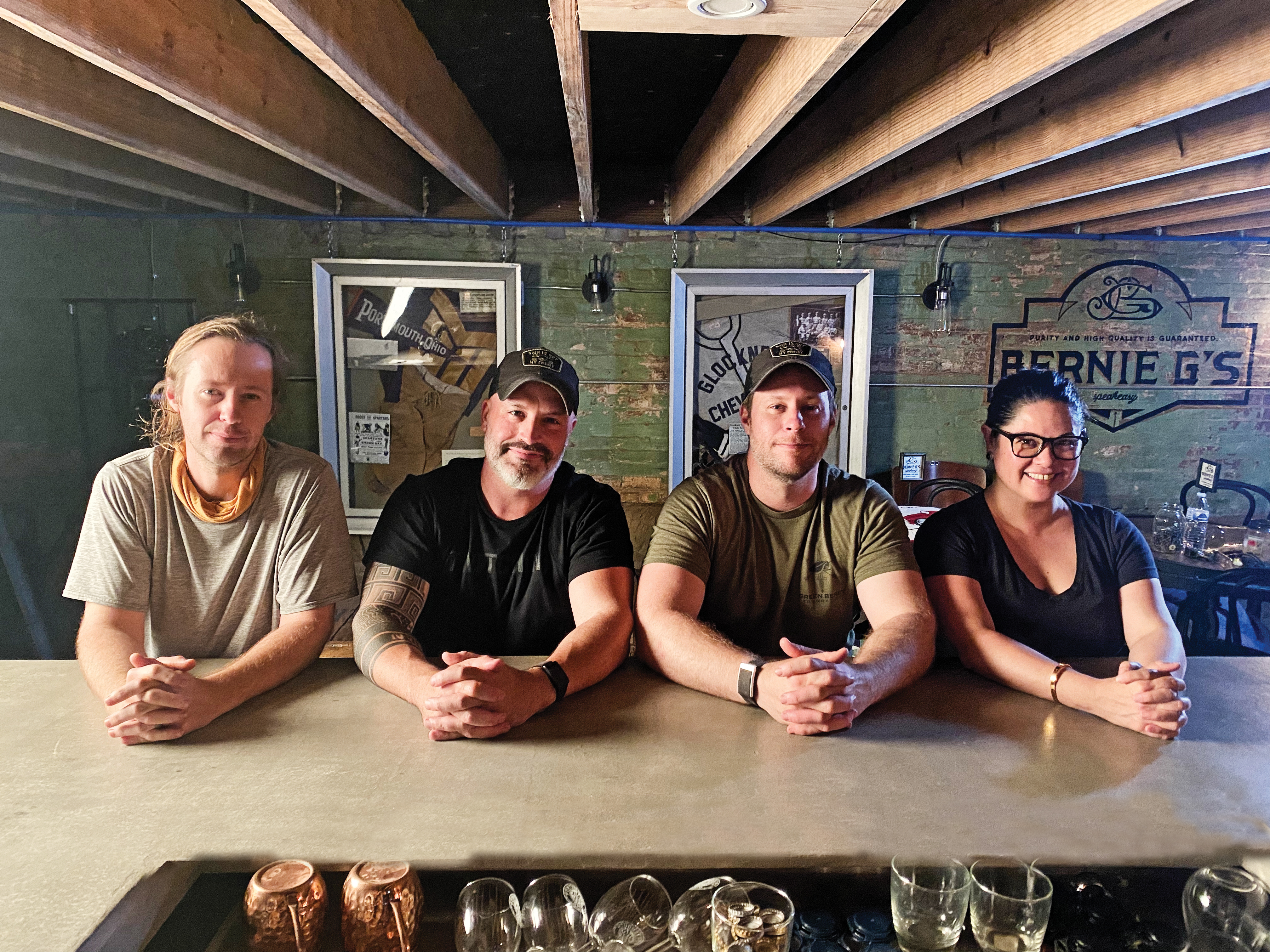In her new documentary, Maile Gerken Millsap ’03 highlights her hometown’s unorthodox approach to fighting the opioid epidemic with CrossFit and community.
When Maile Gerken Millsap ’03 was growing up in Portsmouth, Ohio, it was the picture of quaint small-town life. About two hours from any major city, Millsap and her friends spent their days walking by the river, hanging out at each other’s houses and enjoying high school sports. The rural Appalachian town had a safe, family feel. It was a place where everyone knew everyone, and the community was bolstered by local manufacturing and mom-and-pop shops. As one subject in Millsap’s new film about Portsmouth says, “it was damn near Mayberry,” referencing the idyllic community from “The Andy Griffith Show.”
But when Millsap was away at Elon, everything changed. “It wasn’t until I was in high school that the pain pills came into the area,” she says. “Doctors would prescribe pain pills at these ‘pill mills,’ little pain clinics where people would come in and pay cash for opioids. I had no clue this was going on right in my hometown. And then when I went to Elon, it just got worse and worse.”
When Millsap returned home during breaks, it felt like a different place, hardened by the decline of manufacturing and the rise of a major drug crisis. Portsmouth became one of the worst-hit cities in America from the opioid epidemic. Since 2007, the leading cause of accidental death in Ohio has been overdose. According to the New York Times, 69 people overdosed in Scioto County, where Portsmouth is located, in 2019, the most in two decades.
But the opioid crisis doesn’t define Portsmouth. It’s populated by caring, hardworking people determined to revitalize the community and help those in recovery thrive. This comeback story is the focus of “Small Town Strong,” a new documentary executive produced by Millsap and co-directed by her husband, Chase, and brother-in-law, Spencer.

The film centers on Dale King, an Army veteran and childhood friend of Millsap’s, who returned home to a Portsmouth he didn’t recognize in 2007 after two tours in Iraq. In 2010 he opened the Portsmouth Spartan Kettlebell Club CrossFit gym, where he connected with a member who was recovering from drug addiction and experiencing homelessness. That friendship humanized the opioid epidemic for King, who offered the new acquaintance a job at one of his other businesses and helped him get back on his feet. The gym developed a niche as a place where those in recovery could find support through the power of fitness and community.
“The gym is kind of like the nucleus of change in the community,” Millsap says. There are recovering addicts, small business owners and people from all walks of life working out together and supporting each other, she adds, creating friendships that would not have happened otherwise. What unites them? A common goal to make the community better. “It starts in the gym with that focus and discipline, then goes out into their lives, and you see it translate into the town,” she explains.
Millsap landed at Elon after her older siblings’ leftover college brochures caught her attention, and she immediately fell in love with the university after her first visit to campus. She double majored in broadcast and corporate communications, two passions she combined in her first job selling ads for a local TV station in Charleston, West Virginia. But she dreamed of pursuing a career in the entertainment industry and worked up the courage to move to Los Angeles. “Elon prepares you for everything,” Millsap says. “It creates this well-rounded experience that translates into everything you do — your work, your community.”

She was first hired as a production assistant on the short-lived CBS series “The Class” before moving up the ladder in multiple production roles during the first four seasons of “The Big Bang Theory.” While serving as a production coordinator on several other series through the 2010s, she followed the changes happening in her hometown closely through friends and on social media. “During summer hiatuses, I would go visit family and friends and I could see them making big changes,” Millsap says, “whether it was Dale creating change in the community’s health through the gym, or people starting new small businesses and giving jobs to those in need.”
She convinced her husband, Chase, a documentarian, that their Los Angeles network and Portsmouth network needed to collaborate to tell the community’s story. It marked the first time Millsap produced a project independently without the support of a major studio, but she embraced the challenge. Filming began in 2018 with the intention of making it a television series before shifting gears into a feature-length documentary shot over four years. As executive producer, Millsap’s duties ranged from coordinating with the crew and working with the distributor to running the film’s website and managing communications.
In addition to King, the film follows some of his business partners as they work to rebuild their community, as well as several members of the gym who recount their struggles with addiction and the progress of their recovery. It’s an inspirational story of compassion, community and human resilience, but it doesn’t shy away from the harsh realities of addiction. One of the documentary’s core subjects died from an overdose during filming, and the loss only motivated the gym community to double down on their efforts to fight fentanyl with fitness. The film interweaves these stories with training for The Gauntlet, an annual fitness competition hosted by Portsmouth Spartan Kettlebell Club in which teams of four athletes compete in a series of intensive challenges.

“It takes everyone working together to really create this great change, and it really is turning the town around,” Millsap says. “There are new businesses popping up. There aren’t as many vacant buildings. There’s a new energy that’s really exciting.”
“Small Town Strong” debuted on Amazon and Apple TV+ in October and has garnered a positive response from audiences and critics alike. The film reached No. 1 in viewership among all documentaries on Apple TV+ in its first week of release. It also won the Ohio Humanities Excellence in Documentary Film Award and Rotary Club Service Above Self Award at the Chagrin Documentary Film Festival in Chagrin Falls, Ohio, becoming the first film in the festival’s 14-year history to win multiple awards. Above all, Millsap says she hopes viewers walk away from “Small Town Strong” with a sense of hope, and the belief that people deserve a second chance in the face of adversity.
“It just takes one person to believe in you, and sometimes you just need to believe in yourself,” Millsap says. “You really can make a comeback. The film shows not just individuals’ comebacks but the town’s comeback. It shows you really can conquer anything.”



